
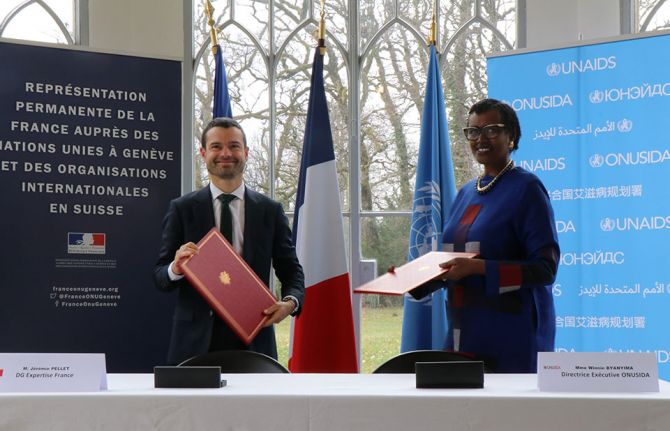
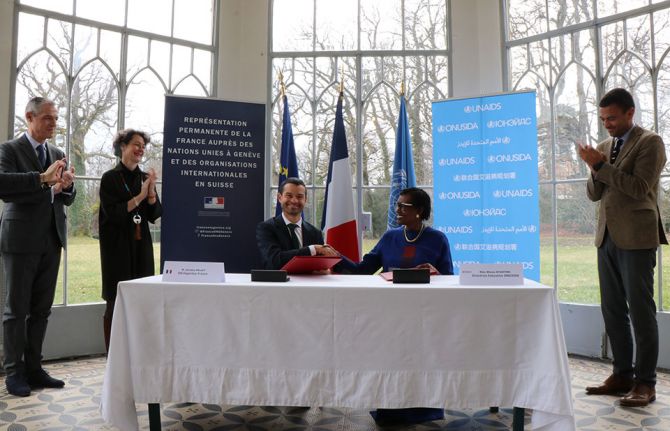
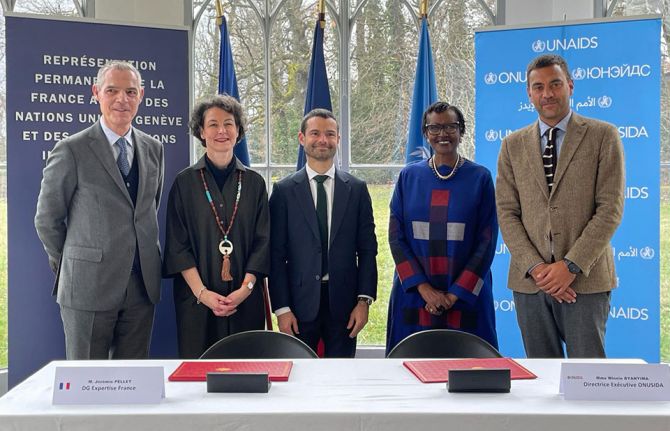
Press Release
Expertise France partners with UNAIDS to fight HIV stigma and discrimination in western and central Africa
28 February 2024 28 February 2024GENEVA, 28 February 2024—The French public international cooperation agency ‘Expertise France’ and UNAIDS have signed a new partnership agreement to fight stigma and discrimination in six western and central African countries.
The aim of the €1.92 million partnership called, "Community response to stigma and discrimination and legislative reform," is to promote access to inclusive HIV services that respect human rights for key populations, including men who have sex with men, people who inject drugs, sex workers, transgender people and young women and adolescent girls in Benin, Cameroon, Côte d'Ivoire, Central African Republic, Senegal and Togo.
"Stigma and discrimination obstruct HIV prevention, testing, treatment and care, and hold back progress towards ending AIDS by 2030,” said Winnie Byanyima, Executive Director of UNAIDS and Under-Secretary-General of the United Nations. “It is only by protecting everyone’s rights that we can protect everyone’s health, so by joining forces with Expertise France we can uphold rights for those in need in the region.”
In the six countries, key populations are disproportionately affected by HIV. In Benin, for example, HIV prevalence in 2022 was 7.2% among sex workers, 8.3% among men who have sex with men and 21.9% among transgender people—while the rate is 0.8% among the general population. In Cameroon, HIV prevalence was 24.3% among sex workers, 20.6% among men who have sex with men and 4% among prisoners—while the rate is 2.6% among the general population.
Anne-Claire Amprou, Global Health Ambassador for France, Ms Byanyima, Jérôme Bonnafont, Permanent Representative of France to the United Nations and Jérémie Pellet, Director General of Expertise France, attended the signing ceremony at the Permanent Mission of France to the United Nations in Geneva, Switzerland.
"This agreement aims to reduce inequalities in access to care and treatment for populations most vulnerable to HIV in western and central Africa. France is thus making a commitment to global health alongside UNAIDS, in an approach based on equity, solidarity and development," said Mr Bonnafont.
Ms Amprou added, "Through this partnership, France is pleased to be able to reaffirm its commitment to strengthening healthcare systems, as well as combatting stigmatization, discrimination and gender inequalities in access to healthcare for the most vulnerable populations, by supporting for community-led efforts.”
As part of the Global AIDS strategy both France and UNAIDS are striving to improve legal and social responses to HIV with a particular focus on reducing gender inequalities and gender-based violence. This new initiative will also aim to reduce systemic barriers by promoting a more favorable legal framework that respects human rights and facilitates better access to legal services.
Jérémie Pellet, Director General of Expertise France said, "This partnership with UNAIDS embodies our commitment to supporting the most vulnerable communities and promoting a more just and inclusive society."
Expertise France via ‘L'Initiative’, an organization which helps national partners prepare and implement projects using funds from the Global Fund to Fight AIDS, Tuberculosis and Malaria, is funding the project. The funds complement efforts under the Global Fund's 7th round of funding, underlining the importance of coordinated action to remove human rights barriers to accessing health services.
Led by the UNAIDS western and central Africa regional office, based in Dakar, the project will be implemented with the support of the Civil Society Institute for HIV and Health, Alliance Côte d'Ivoire and Coalition PLUS.
Expertise France
Expertise France is the French public international cooperation agency. It designs and implements projects which aim to contribute to the balanced development of partner countries, in line with the Sustainable Development Goals (SDGs) of the 2030 Agenda and long-term development.
UNAIDS
The Joint United Nations Programme on HIV/AIDS (UNAIDS) leads and inspires the world to achieve its shared vision of zero new HIV infections, zero discrimination and zero AIDS-related deaths. UNAIDS unites the efforts of 11 UN organizations—UNHCR, UNICEF, WFP, UNDP, UNFPA, UNODC, UN Women, ILO, UNESCO, WHO and the World Bank—and works closely with global and national partners towards ending the AIDS epidemic by 2030 as part of the Sustainable Development Goals. Learn more at unaids.org and connect with us on Facebook, Twitter, Instagram and YouTube.
L’Initiative
France created L’Initiative in 2011 in response to the difficulties that certain countries, particularly French-speaking ones, were having in accessing Global Fund grants. The French Ministry for Europe and Foreign Affairs and Expertise France, the government agency for international technical cooperation, oversee L’Initiative.
Contact
Expertise FranceEric Fleutelot
eric.fleutelot@expertisefrance.fr
UNAIDS Geneva
Charlotte Sector
sectorc@unaids.org

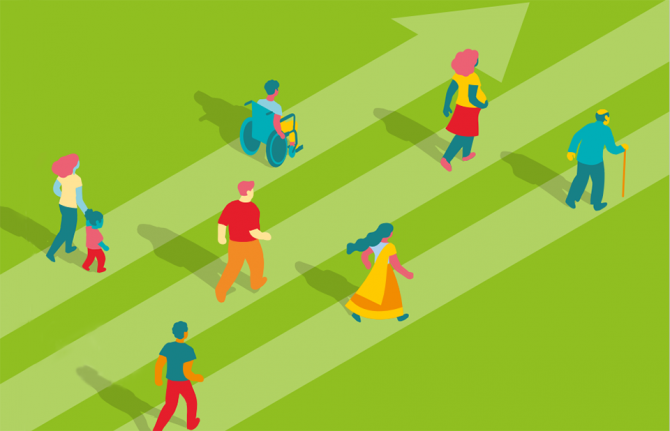
Press Release
Member States negotiating the pandemic instrument have an opportunity to save lives and keep the world safe, says UNAIDS
18 February 2024 18 February 2024As Member States enter the next stage of drafting and negotiating a new Pandemics Prevention, Preparedness and Response Accord, and the targeted revision of the International Health Regulations (IHR), UNAIDS underscores the importance of protecting the gains made in the AIDS response and encourages Member States to use that experience to help prevent and respond to future pandemics and health emergencies.
As part of the Sustainable Development Goals and the 2021 UN Political Declaration on HIV/AIDS, world leaders have committed to ending AIDS as a public health threat by 2030. COVID-19 increased HIV vulnerability and disrupted HIV service access for millions of people around the world. The colliding pandemics of HIV and COVID-19 also led to significant setbacks in the TB response. This experience illustrated powerfully how the impact of other pandemics has the potential to halt and reverse gains achieved in the fight against AIDS.
HIV remains an ongoing pandemic which would be affected by the impact of future pandemics. The actions necessary to make the world safer from future pandemics are vital for ensuring the end of AIDS as a public health threat and for protecting people living with and affected by HIV. Equally, doing what is needed to end AIDS will help keep the world safer from other pandemics.
At UNAIDS, efforts to support Member States in the pandemic treaty negotiations are rooted in evidence. At UNAIDS, we adhere always and only to facts, science, data and the lived experience of the people in the communities and countries where we work to support and guide the HIV response. We resolutely urge that all who are engaging in the negotiations do the same, standing for evidence, and categorically rejecting any misinformation, mischaracterization, or misattribution. The systematic use of facts and data in the HIV response has built public trust, and hugely contributed to advances in HIV prevention, testing, treatment and care.
Important lessons from the HIV response that can strengthen broader pandemic prevention, preparedness and response include:
- The infrastructure built up and strengthened to respond to the HIV pandemic – from lab systems, surveillance and health information systems, procurement and supply chain management through to community infrastructure and governance approaches – is vital for addressing other pandemics. For example, this infrastructure was widely deployed and played an essential role in helping countries to respond to the COVID-19 pandemic.
- Enabling equitable and timely access to scientific solutions, health technologies and medical countermeasures to all those in need is critical for saving lives and ending a pandemic. The role of regulation in ensuring the sharing of technology and know-how for generating local capacities in addressing pandemics is key.
- Tackling the inequalities which drive HIV and other pandemics is key to overcoming them. Closing social and economic gaps within and between countries will help the world to avoid the millions of preventable deaths the AIDS pandemic has seen from being repeated in future pandemics.
- Pandemic prevention, preparedness and response cannot succeed without mobilizing and enabling communities to lead themselves. Investing in community-led mechanisms is critical for successful prevention and response to pandemics.
- Human rights must be at the centre of all actions to prevent and respond to HIV and all other pandemics. The 2021 United Nations Political Declaration on HIV and AIDS, notes the need to “respect, promote, protect, and fulfil all human rights, which are universal, indivisible, interdependent and interrelated.”
- HIV has shown us that beyond being a health issue, a pandemic is a gender, social, economic, security, legal and human rights issue. Whole-of-government, whole-of-society approaches have driven progress in the HIV response. They should be employed at all levels of governance in pandemic preparedness and response.
The gains made and the lesson learnt in the global response to AIDS can help the world to be better prepared for the pandemics to come.
UNAIDS
The Joint United Nations Programme on HIV/AIDS (UNAIDS) leads and inspires the world to achieve its shared vision of zero new HIV infections, zero discrimination and zero AIDS-related deaths. UNAIDS unites the efforts of 11 UN organizations—UNHCR, UNICEF, WFP, UNDP, UNFPA, UNODC, UN Women, ILO, UNESCO, WHO and the World Bank—and works closely with global and national partners towards ending the AIDS epidemic by 2030 as part of the Sustainable Development Goals. Learn more at unaids.org and connect with us on Facebook, Twitter, Instagram and YouTube.

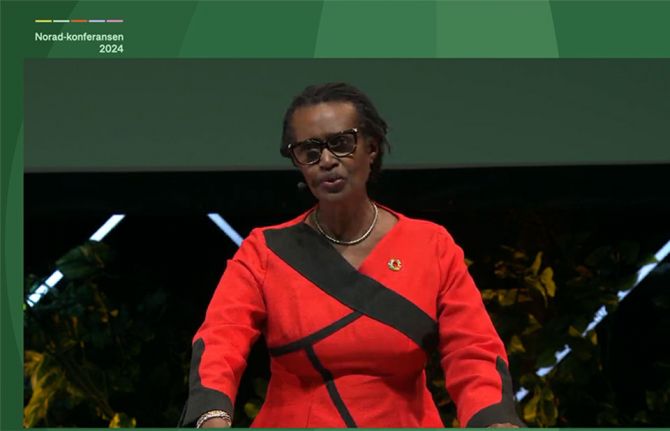
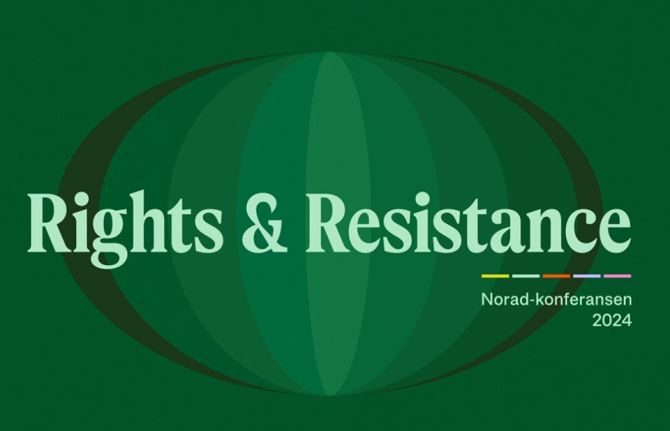
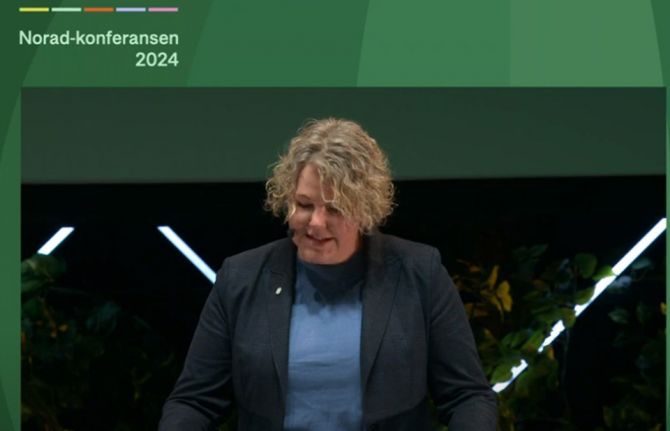
Press Release
UNAIDS Executive Director: let women and girls lead to protect and advance human rights globally
01 February 2024 01 February 2024OSLO/GENEVA, 1 February 2024—At a conference hosted in Oslo by the Norwegian Agency for Development Cooperation (Norad), UNAIDS Executive Director, Winnie Byanyima, has made an impassioned call to all international partners to support women and girls from marginalized communities at the frontlines of the defence of human rights. Only by ensuring that the rights of everyone are protected can the world ensure that the health of everyone is protected, and that the Sustainable Development Goals are achieved.
In her keynote speech at the Rights and Resistance conference Ms Byanyima said, “We cannot separate sustainable development from human rights. We must put human rights at the centre of our development efforts. The AIDS movement, of which I am proud to be part, has been resolute in this. We have demonstrated how patriarchal, racist, and homophobic laws, policies, practices and norms undermine health and hurt everyone.”
She said that progress was in peril from a backlash on human rights but that hard-won gains could be protected and expanded by doing three things:
- Deepening our understanding of the pushback on human rights and democracy
- Bringing our efforts together and connecting the dots to link the struggles, thinking long term and being bold
- Backing and resourcing the people most impacted by the attacks on rights—foremost by supporting women and girls from the poorest and most marginalized communities
In her speech, Ms Byanyima underlined some of the gains made by human rights defenders in recent years through the leadership of women and girls and LGBTQ communities.
- 50 million more girls are in school than were in 2015
- Whereas a few decades ago, two-thirds of countries criminalised same-sex relationships, today two-thirds of countries do not criminalise them.
Opening the conference, Norway’s International Development Minister, Anne Beathe Tvinnereim, said, “We have an obligation to back those who risk their lives fighting for values that we take for granted. Norway will continue aiding those actors on the ground who stress the universality of human rights. We will support free and independent media, including at the local level. Finally, all Norwegian development aid shall be rights-based."
Human rights violations continue to drive the HIV epidemic among women and girls. Every week, 4000 adolescent girls and young women aged 15—24 became infected with HIV globally in 2022. 3100 of these infections occurred in sub-Saharah Africa.
Upholding the rights of marginalized communities is vital for enabling success in the HIV response. When marginalized communities are criminalized or stigmatized, their vulnerability to HIV infection increases, and their access to HIV prevention, treatment, care, and support services is obstructed. UNAIDS research shows that the decriminalization of same-sex relationships is a crucial step in ending the AIDS pandemic.
UNAIDS is highlighting that the recent, well-coordinated and well-funded global pushback against women’s rights, against the human rights of LGBTQ people, against sexual and reproductive health and rights, against democracy and against civic space is not only a threat to everyone’s freedom, it is a threat to everyone’s health. In response to this threat, the AIDS movement and its allies are pushing back against the pushback, reminding world leaders of their commitments to uphold all human rights for all people.
UNAIDS is supporting frontline human rights defenders in both crisis response and in the longer-term work and is helping to expand support for human rights by demonstrating that laws, policies and practices which uphold human rights help countries to ensure public health and to get on track to end AIDS.
The UNAIDS Executive Director expressed confidence that the advancement of rights can be won. “Progress is not automatic. But if we are courageous and united, progress is possible,” said Ms Byanyima.
The full version of Ms. Byanyima’s speech (delivered at 12:50 CET February 1) can be viewed here.
UNAIDS
The Joint United Nations Programme on HIV/AIDS (UNAIDS) leads and inspires the world to achieve its shared vision of zero new HIV infections, zero discrimination and zero AIDS-related deaths. UNAIDS unites the efforts of 11 UN organizations—UNHCR, UNICEF, WFP, UNDP, UNFPA, UNODC, UN Women, ILO, UNESCO, WHO and the World Bank—and works closely with global and national partners towards ending the AIDS epidemic by 2030 as part of the Sustainable Development Goals. Learn more at unaids.org and connect with us on Facebook, Twitter, Instagram and YouTube.

Press Release
UNAIDS Board calls on member states to resource and tailor HIV response that integrates diverse needs of transgender people
19 December 2023 19 December 2023GENEVA, 19 December 2023—During the 53rd meeting of UNAIDS’ Programme Coordinating Board (PCB) held in Geneva, Switzerland, the UNAIDS board adopted decisions on key populations with a focus to increase access to HIV prevention, testing, treatment and other social protection services for transgender people.
Member states and the Joint Programme recognized that each key population, including transgender people, is diverse, and experiences multiple and intersecting forms of stigma and discrimination, and therefore requires evidence-based, data-informed tailored programmes, services and resources that are responsive to their specific needs in the HIV response.
Exact follow-up actions they agreed upon include:
- Address gaps in population size estimates and expand disaggregated data on key populations focusing on existing gaps in transgender populations, in diverse situations and conditions, including through community-led data generation;
- Optimally resource and scale-up tailored and effective HIV prevention, testing and treatment programmes and services that address the diverse needs and circumstances of key populations, including transgender people;
- Increase the proportion of community-led services for HIV prevention, testing and treatment and for societal enablers to reach the 30-80-60 targets, as described in the Global AIDS Strategy 2021-2026, including through mechanisms to increase and facilitate funding and sustainable financing for community-led HIV organizations, including for those led by key populations;
- Address gender inequality, all forms of stigma, discrimination and marginalization, and review and reform harmful and punitive laws and policies that hinder access to HIV-related services for key populations;
- Reinforce an evidence-based public health approach to HIV, particularly in the context of gender equality and human rights;
- Integrate social protection with health and HIV responses by taking people-centered approaches, which addresses economic inequalities making education, welfare, and social protection systems more inclusive of key populations.
And finally, the board requested UNAIDS to reinforce and expand the meaningful engagement and leadership of all key populations, including transgender people, in the HIV response.
This is the first time a member state-led UN body has adopted a consensus decision (without a vote) that includes specific references and commitments to transgender people and actions to be taken by member states. Deputy Executive Director of UNAIDS Christine Stegling said, “We have broken through a barrier. UNAIDS is now fully focused on maximizing the programmatic impact of this decision in-country, for communities and with communities.”
The past two PCB meetings took place midway through the Global AIDS Strategy 2021-2026 so this decision will help UNAIDS focus on achieving the 2025 targets. The UNAIDS PCB is the premier UN and global forum on HIV, bringing together civil society, cosponsors and member states to help chart the future of the response to HIV, including the development of the next Global AIDS Strategy, the vision for 2030 and beyond. The PCB NGO delegates are comprised of people living with HIV and/or key populations including transgender people. They participate in all aspects of the board’s work and strongly advocate for people living with HIV and affected by HIV.
UNAIDS
The Joint United Nations Programme on HIV/AIDS (UNAIDS) leads and inspires the world to achieve its shared vision of zero new HIV infections, zero discrimination and zero AIDS-related deaths. UNAIDS unites the efforts of 11 UN organizations—UNHCR, UNICEF, WFP, UNDP, UNFPA, UNODC, UN Women, ILO, UNESCO, WHO and the World Bank—and works closely with global and national partners towards ending the AIDS epidemic by 2030 as part of the Sustainable Development Goals. Learn more at unaids.org and connect with us on Facebook, Twitter, Instagram and YouTube.
UNAIDS Governance

Press Release
Governments commit to step up the global HIV response to end AIDS as a public health threat by 2030
14 December 2023 14 December 2023GENEVA, 14 December 2023—The 53rd meeting of UNAIDS’ Programme Coordinating Board (PCB) concluded today in Geneva, Switzerland, with Board members making strong commitments to redouble efforts to end AIDS by 2030.
In her remarks to the Board the Executive Director of UNAIDS Winnie Byanyima said, “I wish I could tell you now was the time to relax, but we are not done yet. And pulling back before we are done—that is how pandemics resurge; how the least powerful get left behind; how the virus thrives. In a pandemic, there is no standing still. If we do not make progress, the virus will.”
This PCB meeting took place at a critical time for the response to HIV, midway through the Global AIDS Strategy 2021-2026 as UNAIDS is redoubling its focus on achieving the 2025 targets.
The First Lady of Namibia, Monica Geingos, delivered the keynote address saying, “Partial success in the AIDS response coupled with emerging pandemics has given rise to complacency that must be reversed. Fresh thinking and approaches are urgently required to reach the 2025 targets and to achieve the goal of ending the pandemic by 2030.”
Addressing the shortfalls in global funding for HIV and for UNAIDS, Ms Byanyima urged donors to front-load resources, support developing countries to grow their fiscal space, and to fully fund UNAIDS with multi-year funding (UNAIDS currently has a shortfall of US$ 50 million). In 2022, US$ 20.8 billion was available for the global response to HIV, far short of the US$ 29.3 billion needed by 2025.
“We remain deeply concerned about the current funding situation of the Joint Programme and the expected impact on different strategic result areas. We are encouraging all PCB member states and observers to seek ways to augment their support to the Joint Programme in 2024,” said Binod Mahanty, Health Adviser, Federal Ministry of Health of Germany.
Several donors have recently increased their core contributions to UNAIDS, including Côte d’Ivoire, the Netherlands and the United States. During the meeting France announced a 50% increase in its voluntary contribution to UNAIDS, Germany announced an additional 1 million Euros, and Luxembourg announced an additional 100 000 Euros for UNAIDS.
Other countries have also stepped-up support recently, including Australia which announced an investment of up to AU$12 million for a new partnership with UNAIDS to let communities lead in ending AIDS in the Asia Pacific region. Let Communities Lead was the theme of this year’s World AIDS Day report from UNAIDS, which emphasized the critical role communities play in responding to HIV, and how underfunding and harmful barriers are holding back their lifesaving work and obstructing the end of AIDS.
“UNAIDS is a strong voice promoting human rights and fighting inequality, through the evidence-based work addressing the social determinants of HIV, including stigma and discrimination based on gender and sexual identity,” said, Ms Jannicke Graartrud Deputy Permanent Representative of Norway.
"UNAIDS has been providing Cambodia with important support through resource mobilization, a sustainability roadmap and strategic plan, strategic information and data collection and analysis, scale up of innovative prevention and treatment tools as well as on community engagement and strengthening community-led activities," said Mouly Ieng, Senior Minister, Chair of the National AIDS Authority of Cambodia, Phnom Penh. "Countries are making significant efforts, please do not leave us behind."
A thematic segment on HIV testing was held on the last day of the PCB. Board members discussed how HIV testing services are the gateway to HIV prevention, treatment, care and other support services. The Keynote speaker for the HIV testing segment was Professor Kevin Fenton CBE, Public Health England. He said, “In our efforts to end HIV transmission by 2030, we must let communities lead in redoubling our efforts to deliver what we know works – HIV prevention, testing, PrEP and HIV treatment – at scale. And we must work to end HIV stigma, which prevents so many from living their authentic life, full of compassion, free of fear and able to contribute fully to society.”
“Ending AIDS is possible but only if we take bold action to revolutionize HIV prevention, scale-up testing, fight stigma, discrimination and inequalities, reach young women and girls and key populations with HIV services, remove harmful laws, increase resources and strengthen the multisectoral approach,” said Ms Byanyima.
The UNAIDS PCB is the premier UN and global forum on HIV, bringing together civil society, co-sponsors and member states to help chart the co-creation of the future of the response to HIV, including the development of the next Global AIDS Strategy, the vision for 2030 and beyond.
The 53rd meeting of the PCB was chaired by Germany, with Kenya serving as the Vice-Chair and Brazil as Rapporteur. The 54th meeting to be held in June 2024, will be chaired by Kenya, with Brazil serving as Vice-Chair and the Netherlands as Rapporteur.
Read the Report to the Board by the UNAIDS Executive Director.
UNAIDS
The Joint United Nations Programme on HIV/AIDS (UNAIDS) leads and inspires the world to achieve its shared vision of zero new HIV infections, zero discrimination and zero AIDS-related deaths. UNAIDS unites the efforts of 11 UN organizations—UNHCR, UNICEF, WFP, UNDP, UNFPA, UNODC, UN Women, ILO, UNESCO, WHO and the World Bank—and works closely with global and national partners towards ending the AIDS epidemic by 2030 as part of the Sustainable Development Goals. Learn more at unaids.org and connect with us on Facebook, Twitter, Instagram and YouTube.
UNAIDS Governance

Press Release
To end AIDS in Africa, UNAIDS urges governments and partners to ramp up the response to HIV
09 December 2023 09 December 2023HARARE/GENEVA, 9 December 2023—Africa can end AIDS as a public threat, but to do so governments and international partners need to increase actions to reach everyone in need. Actions include accelerating treatment for children living with HIV and HIV prevention for adolescent girls, young women and key populations. Governments also need to support communities’ vital leadership role in the HIV response. This was the message from UNAIDS as the 22nd International Conference on AIDS and Sexually Transmitted Infections in Africa (ICASA) drew to a close.
At ICASA, thousands of delegates, including AIDS activists, grassroots communities, governments, private sector partners, key populations, doctors, scientists, donors and other international and African stakeholders came together to advance progress in the HIV response.
“Emerging from this conference we are clear. To end AIDS, governments and partners need to step up HIV prevention efforts. And they need to ensure that every person living with HIV has access to treatment, both current antiretroviral treatments and new longer-lasting injectable medicines, to live long and healthy lives,” said Winnie Byanyima, Executive Director of UNAIDS. “Collectively we are calling for health-justice and equality for all people, including people living with and affected by HIV. Pharmaceutical companies need to put people first over profits by making sure that treatment is affordable and easily accessible.”
While progress has been made in expanding access to antiretroviral treatment—too many people are still not accessing treatment, including 4.7 million people living with HIV in Africa. Children remain disproportionally affected—across Africa, only 55% of children living with HIV had access to antiretroviral therapy in 2022, compared with 83% of adults.
While 3 million children have been protected from HIV since 2000 by expanding access to antiretroviral treatment for mothers living with HIV, still there were 110 000 new infections among children (aged 0-14 years) in Africa in 2022.
HIV prevention services are also lacking, particularly for young women and adolescent girls, and gender inequalities continue to drive new infections in Africa. Among young people (aged 15-24) in Africa, 77% of new HIV infections in that age group were among young women, and 23% among young men in 2022.
“AIDS is an injustice of inequalities. If you look at people who are not accessing treatment and people who are dying of the disease, you will see how inequalities are obstructing their access to HIV services,” said Ms Winnie Byanyima. “We can end AIDS by redoubling our efforts to fight the pandemic, including by reaching people who are most affected by HIV, including young women and girls and key populations.”
Delegates attending the conference called for accelerated innovation to quickly turn the tide against AIDS. They called for the speedy rollout of new HIV prevention options such as long-acting injectable cabotegravir (CAB-LA) which can be administered once every two months to prevent HIV. The World Health Organization has urged countries to consider CAB-LA as a safe and highly effective prevention option for people at substantial risk of HIV infection.
In its World AIDS Day report Let Communities Lead, UNAIDS demonstrated that where communities are at the forefront of the AIDS response, countries were able to make significant progress. The report shows that AIDS can be ended as a public health threat by 2030 if communities on the frontlines get the full support they need from governments and donors, including political and financial backing.
Communities at the conference urged governments to recognize the important work they do. They called for the removal of obstructive laws criminalizing key populations, including LGBTQI people, people who inject drugs and sex workers. Criminalizing key populations prevents them from accessing HIV services, putting the fight against the pandemic at risk.
Non-governmental organizations working to end AIDS often have to operate with insufficient budgets and little political or no political support, limiting their full potential to do their work, including providing life-saving services. Governments need to increase political and financial support, especially for community-led responses and civil society organizations working to end AIDS. Authorities need also to guarantee safe operating environments for community-led organizations by removing harmful laws which criminalize key populations.
UNAIDS
The Joint United Nations Programme on HIV/AIDS (UNAIDS) leads and inspires the world to achieve its shared vision of zero new HIV infections, zero discrimination and zero AIDS-related deaths. UNAIDS unites the efforts of 11 UN organizations—UNHCR, UNICEF, WFP, UNDP, UNFPA, UNODC, UN Women, ILO, UNESCO, WHO and the World Bank—and works closely with global and national partners towards ending the AIDS epidemic by 2030 as part of the Sustainable Development Goals. Learn more at unaids.org and connect with us on Facebook, Twitter, Instagram and YouTube.


Press Release
Executive Director of UNAIDS awarded ‘Most outspoken Ally of the Year’ for her work supporting the rights of marginalized communities
08 December 2023 08 December 2023HARARE/GENEVA, 8 December 2023—The Executive Director of UNAIDS, Winnie Byanyima has been recognized as the ‘Most Outspoken Ally of the Year’ by Global Black Gay Men Connect for her extensive work advocating for the rights and well-being of marginalized communities. The announcement was made at the African Men Health and Rights award ceremony which took place today during the 22nd International Conference on AIDS and STIs.
“I am deeply honoured, and I accept this award on behalf of all the human rights and social justice warriors tackling inequalities around the world today,” said Ms Byanyima. “I will continue to be your outspoken ally, promoting inclusivity, fighting stigma and discrimination, and championing equal access to healthcare and human rights for all.”
“Your tireless advocacy for the rights and well-being of marginalized communities, including the LGBTQ+ community, has not gone unnoticed, said Michael Ighodaro, Co-founder, Global Black Gay Men Connect. “Your dedication is truly commendable. Your voice has been an unwavering source of support and inspiration for countless individuals and organizations across the globe.
Gay men and other men who have sex with men continue to be stigmatized and marginalized, keeping them away from health and social services and rendering them more at risk of becoming infected with HIV and less likely to seek treatment. In 2022, HIV prevalence amongst gay men and other men who have sex with men was almost 13% in Eastern and Southern Africa and 8% in West and Central Africa.
Today 67 countries still criminalize same sex relations. Evidence shows that criminalizing LGBTQI people for who they are and who they love prevents them from accessing HIV services. Even when they can access those services, they cannot do so with dignity due to the stigma and discrimination they face, which further exacerbates their vulnerability.
Countries that do not criminalize LGBTQI people are more likely to reach marginalized communities most affected by HIV. In recent years many African countries have moved away from the archaic laws that criminalize same sex sexual relations. Since 2016, Angola, Botswana, Gabon, Mauritius, and Seychelles have repealed laws criminalizing LGBTQI people. Progress has been uneven however, and alarming backsliding on punitive laws has been seen in a number of countries.
“Movements like Global Black Gay Men Connect is on the frontlines of the HIV response around the world. We must safeguard their leadership role to end AIDS and create a more just and equitable world.” said Ms Byanyima.
GLOBAL BLACK GAY MEN CONNECT
Global Black Gay Men Connect is an international, social justice platform that brings together black gay men from around the world to foster resilience against oppression and to advocate for the human rights and wellbeing of marginalized communities, including human rights centered HIV prevention and treatment services.
UNAIDS
The Joint United Nations Programme on HIV/AIDS (UNAIDS) leads and inspires the world to achieve its shared vision of zero new HIV infections, zero discrimination and zero AIDS-related deaths. UNAIDS unites the efforts of 11 UN organizations—UNHCR, UNICEF, WFP, UNDP, UNFPA, UNODC, UN Women, ILO, UNESCO, WHO and the World Bank—and works closely with global and national partners towards ending the AIDS epidemic by 2030 as part of the Sustainable Development Goals. Learn more at unaids.org and connect with us on Facebook, Twitter, Instagram and YouTube.

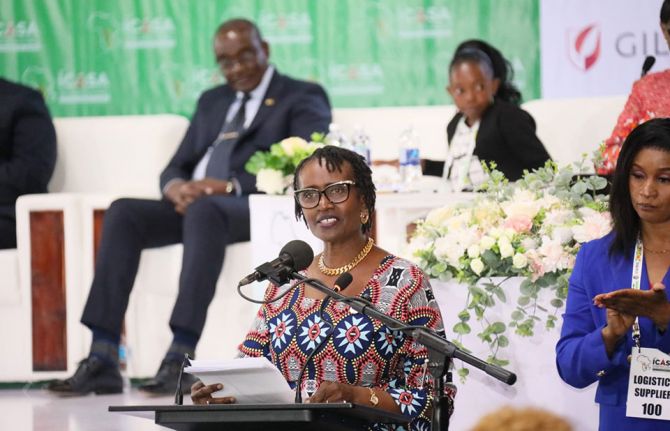
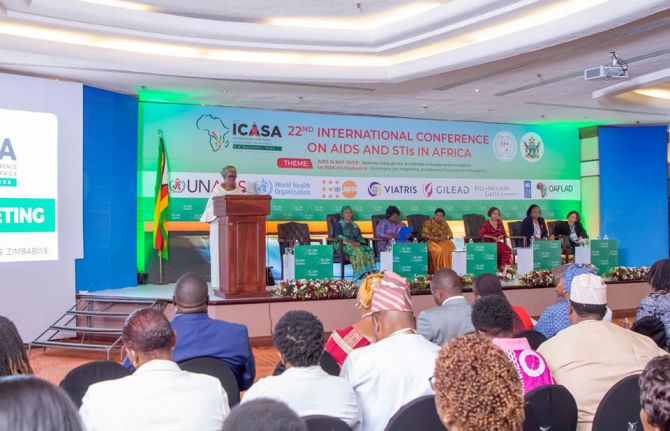
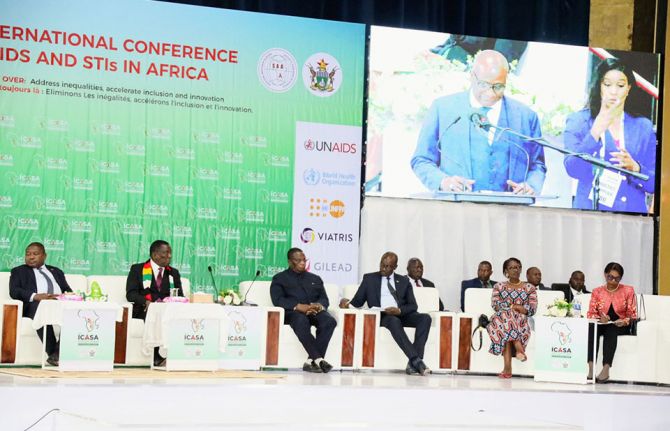
Press Release
UNAIDS calls for accelerated political and financial support for communities to lead in the response to HIV
04 December 2023 04 December 2023GENEVA/HARARE, 4 December 2023— The world can end AIDS as a public health threat if communities on the frontlines of the HIV response are fully engaged and supported to do their work. This was the important message UNAIDS brought today to the opening of the 22nd International Conference on AIDS and Sexually Transmitted Infections in Africa (ICASA), which is being held in Harare, Zimbabwe from 4-9 December.
Under the theme AIDS IS NOT OVER – participants will be calling for inequalities to be addressed and innovation to be accelerated to end AIDS. They will be urging for more support to community-led responses to deliver essential HIV services to people on the margins of society who are often hard to reach.
“AIDS is not over, and it continues to disproportionally affect the most marginalized in poor countries in Africa where some of the highest HIV burdens are found,” said Winnie Byanyima, Executive Director of UNAIDS. “We have an amazing opportunity to end the AIDS epidemic by 2030 by supporting community led organizations to lead the way, and by tackling the drivers of HIV, such as inequalities and harmful laws,” added Ms Byanyima.
Around 66% of the 39 million people living with HIV live in Africa and some 51% of new HIV infections occurred on the continent, as did 61% of AIDS-related deaths.
Communities on the frontlines
Communities from South Africa to Thailand to Brazil waged the battles in the 1990’s and in the 2000’s to break pharmaceutical monopolies on access to HIV treatment. Their campaigning brought the price of these life-saving medicines down from US$ 25 000 per person per year in 1995 to as low as US$ 70 per person per year in many of the countries most affected by HIV.
Communities have been fighting to overturn laws that criminalize people most at risk of HIV. Several countries in Africa including Botswana, Angola, Gabon and just this year, Mauritius have overturned these harmful laws.
“Giving LGBTQI people the freedom to come forward and access the services they need to save their lives – this is community action,” said Ms Byanyima. “Communities have taken services right to the last person in the corners of the villages – they know who needs to be reached and they reach them.”
AIDS still claiming lives unnecessarily
While there is a clear path that ends AIDS, including through collaboration between governments and communities, AIDS claimed a life every minute in 2022. Globally 9.2 million people living with HIV do not have access to HIV treatment, just over half are in Africa where AIDS remains the fourth-leading cause of death.
Women and girls are still disproportionally affected. In sub-Saharan Africa, 3100 young women and girls became infected with HIV every week in 2022. Across Africa 85% of new infections among adolescents (aged 10-19) are among adolescent girls and 15% among adolescent boys. For young people (aged 15-24) some 77% of new infections are among young women and 23% among young men.
However, there is hope. There has been a decline in the number of people who were infected with HIV in 2022, showing that the end of AIDS is possible. The number of new infections represented the fewest people who acquired HIV in 2022 than at any point since the late 1980s. The biggest declines in annual new HIV infections in that period have been in eastern and southern Africa (57% reduction) and western and central Africa (49% reduction) since 2010 for both regions.
In sub-Saharan Africa, Botswana, Eswatini, Rwanda and Zimbabwe, are on the path that ends AIDS. In these countries, 95% of the people who are living with HIV know their HIV status, 95% of the people who know that they are living with HIV are on life-saving antiretroviral treatment, and 95% of people who are on treatment are virally suppressed. When a person’s viral load is suppressed, HIV cannot be transmitted. A further 16 other countries are close to meeting these targets.
Embrace science and innovation
Communities drive innovation in the response to HIV. The innovation, passion and insight of communities are crucial to end AIDS. In Windhoek, Namibia, a self-funded project by the youth Empowerment Group is using e-bikes to deliver HIV medicines, food and adherence support to young people who often cannot attend clinics due to their schooling hours.
Botswana’s success in reducing vertical transmission of HIV stems from its high coverage of HIV testing and treatment among women overall. Women living with HIV start antiretroviral therapy well before becoming pregnant, resulting in achieving and sustaining viral load suppression. That’s following the science.
Ensure political support, sufficient sustainable funding for communities and innovation to end AIDS
Despite existing and clear evidence that community-led responses have a positive impact, communities are not yet getting the recognition and the political and financial support they need, instead, communities are under-recognized and under-resourced and, in some places, even under attack.
Underfunding of community-led initiatives is holding them back from operating and expansion. If these obstacles are removed, community-led organizations can add even greater impetus to the global HIV response, advancing progress towards the end of AIDS.
In the 2021 Political Declaration on ending AIDS, United Nations member states recognized the critical role communities play in HIV service delivery, particularly to key populations. However, whereas in 2012, over 31% of all HIV resources were channelled through civil society organizations, in 2021, only 20% of funding for HIV was allocated for civil society—an unprecedented backsliding in commitments which is costing lives.
“When community-led organizations are supported politically and financially to accelerate their life-saving work, the end result can be an end to AIDS as a public health threat,” said Ms Byanyima. “An AIDS-free world is possible, but only if communities lead.”
UNAIDS
The Joint United Nations Programme on HIV/AIDS (UNAIDS) leads and inspires the world to achieve its shared vision of zero new HIV infections, zero discrimination and zero AIDS-related deaths. UNAIDS unites the efforts of 11 UN organizations—UNHCR, UNICEF, WFP, UNDP, UNFPA, UNODC, UN Women, ILO, UNESCO, WHO and the World Bank—and works closely with global and national partners towards ending the AIDS epidemic by 2030 as part of the Sustainable Development Goals. Learn more at unaids.org and connect with us on Facebook, Twitter, Instagram and YouTube.
Contact
Bathsheba OkwenjeUNAIDS Regional Support Team, Eastern and Southern Africa
tel. +250 789 358 817
okwenjeb@unaids.org
Hlulani Robert Shivambu
UNAIDS Global Communications Officer
tel. +27 (0) 83 608 1498
shivambuh@unaids.org

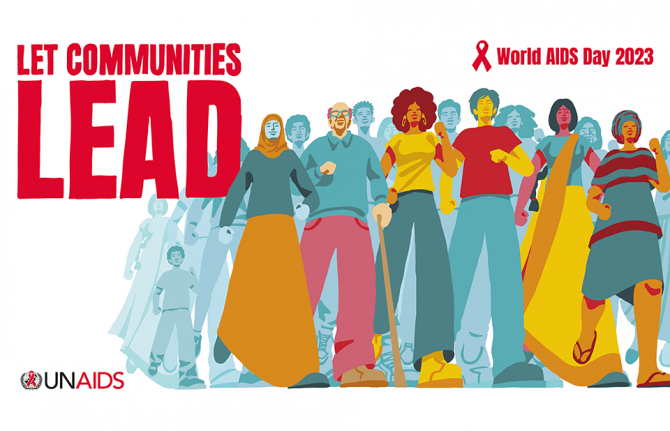
Press Release
Ahead of World AIDS Day UNAIDS is calling for urgent support to Let Communities Lead in the fight to end AIDS
30 November 2023 30 November 2023A new report by UNAIDS demonstrates the critical role communities play, and how underfunding and harmful barriers are holding back their lifesaving work and obstructing the end of AIDS.
LONDON/GENEVA, 28 November 2023—As World AIDS Day (1 December) approaches, UNAIDS is urging governments across the world to unleash the power of grassroots communities across the world to lead the fight to end AIDS. A new report launched today by UNAIDS, Let Communities Lead, shows that AIDS can be ended as a public health threat by 2030, but only if communities on the frontlines get the full support they need from governments and donors.
“Communities across the world have shown that they are ready, willing and able to lead the way. But they need the barriers obstructing their work to be pulled down, and they need to be properly resourced,” said Winnie Byanyima, Executive Director of UNAIDS. “Too often, communities are treated by decision-makers as problems to be managed, instead of being recognised and supported as leaders. Communities are not in the way, they light the way to the end of AIDS.”
The report, launched in London during a World AIDS Day event organized by the civil society organization STOPAIDS, shows how communities have been the driving force for progress.
Community advocacy from the streets to the courtrooms to parliaments has secured groundbreaking changes in policy. Communities’ campaigning helped open up access to generic HIV medicines, leading to sharp, sustained reductions in the cost of treatment from US$ 25 000 per person per year in 1995 to less than US$ 70 in many countries most affected by HIV today.
Let Communities Lead shows that investing in community-led HIV programmes delivers transformational benefits. It sets out how programmes delivered by community-based organizations in Nigeria were associated with a 64% increase in access to HIV treatment, a doubling of the likelihood of HIV prevention service utilization, and a four-fold increase in consistent condom use among people at risk of HIV. It also notes how, among sex workers reached by a package of peer-based services in the United Republic of Tanzania, the HIV incidence rate was reduced to below half (5% vs 10.4%).
“We are the vehicle for change that can end systematic injustices that continue to fuel HIV transmission. We have seen groundbreaking developments with U=U, improved access to medicines, and have made great strides in decriminalisation," said Robbie Lawlor, Co-Founder of Access to Medicines Ireland. “Yet, we are expected to move mountains without being financially supported. We are supposed to fight for a more equitable world and are tasked with dismantling stigma yet are side-lined in crucial discussions. We are at a tipping point. Communities can no longer be relegated to the periphery. The time for leadership is now.”
The report highlights how communities are at the forefront of innovation. In Windhoek, Namibia, a self-funded project by the youth Empowerment Group is using e-bikes to deliver HIV medicines, food and adherence support to young people who often cannot attend clinics due to their schooling hours. In China, community organizations developed smartphone apps that link people to self-testing which contributed to a more than four-fold increase in HIV tests across the country from 2009 to 2020.
The report reveals how communities are also holding service providers to account. In South Africa five community networks of people living with HIV inspected 400 sites across 29 districts and conducted more than 33 000 interviews with people living with HIV. In the Free State province, these findings led provincial health officials to implement new appointment protocols to reduce clinic wait times and three- and six-month dispensing of antiretroviral medicines.
“I am extremely concerned about the exclusion from health services of key populations like the LGBT+ community,” said Andrew Mitchell, Minister of State for Development and Africa. “The UK champions the rights of such communities, and we will continue to protect them, working closely with our partners in civil society. I thank UNAIDS for keeping us focused on the inequities driving the pandemic and I look forward to working with our partners to champion the voice of people living with HIV and end AIDS as a public health threat by 2030.”
Despite the clear evidence of community-led impact, community-led responses are unrecognized, under-resourced and in some places even under attack. Crackdowns on civil society and on the human rights of marginalized communities are obstructing communities from providing HIV prevention and treatment services. Underfunding of community-led initiatives is leaving them struggling to continue operating and holding them back from expansion. If these obstacles are removed, community-led organizations can add even greater impetus to end AIDS.
In the 2021 Political Declaration on ending AIDS, United Nations member states recognized the critical role communities play in HIV service delivery, particularly to people most at risk of HIV. However, whereas in 2012, when over 31% of HIV funding was channelled through civil society organizations, ten years later, in 2021, only 20% of funding for HIV was available—an unprecedented backsliding in commitments which has cost and is continuing to cost lives.
“At this time, community-led action is the most important countermeasure in the AIDS response,” said Solange Baptiste, Executive Director of the International Treatment Preparedness Coalition. “Yet, shockingly, it isn’t a cornerstone of global plans, agendas, strategies, or financing mechanisms for improving pandemic preparedness and health for all. It is time to change that.”
Every minute, a life is lost to AIDS. Every week, 4000 girls and young women become infected with HIV, and out of the 39 million people living with HIV, 9.2 million do not have access to lifesaving treatment. There is a Path that Ends AIDS and AIDS can be ended by 2030, but only if communities lead.
UNAIDS is calling for: Communities’ leadership roles to be made core in all HIV plans and programmes; Communities’ leadership roles to be fully and reliably funded; And for barriers to communities’ leadership roles to be removed.
The report features nine guest essays from community leaders, in which they share their experience on the achievements they have secured, the barriers they face, and what the world needs to end AIDS as a public health threat.
UNAIDS
The Joint United Nations Programme on HIV/AIDS (UNAIDS) leads and inspires the world to achieve its shared vision of zero new HIV infections, zero discrimination and zero AIDS-related deaths. UNAIDS unites the efforts of 11 UN organizations—UNHCR, UNICEF, WFP, UNDP, UNFPA, UNODC, UN Women, ILO, UNESCO, WHO and the World Bank—and works closely with global and national partners towards ending the AIDS epidemic by 2030 as part of the Sustainable Development Goals. Learn more at unaids.org and connect with us on Facebook, Twitter, Instagram and YouTube.
Contact
UNAIDS GenevaSophie Barton Knott
tel. +41 79 514 6896
bartonknotts@unaids.org
UNAIDS Media
communications@unaids.org
UNAIDS Geneva
Michael Hollingdale
tel. +41 79 500 2119
hollingdalem@unaids.org
World AIDS Day message
World AIDS Day 2023
Watch the launch
World AIDS Day report
World AIDS Day videos

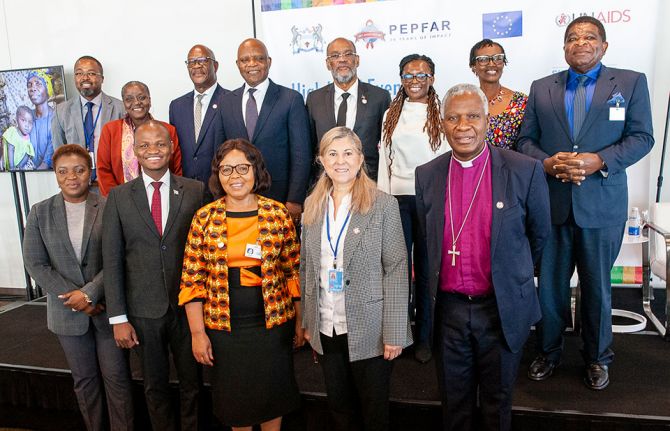
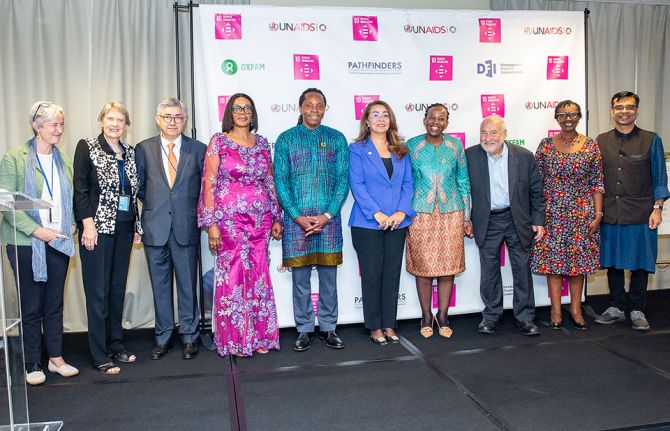
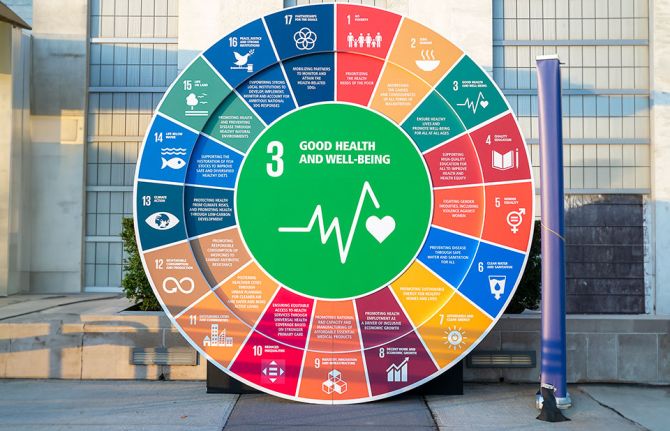
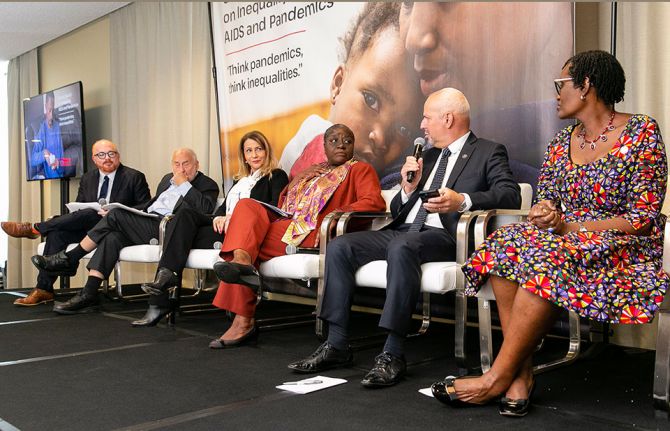
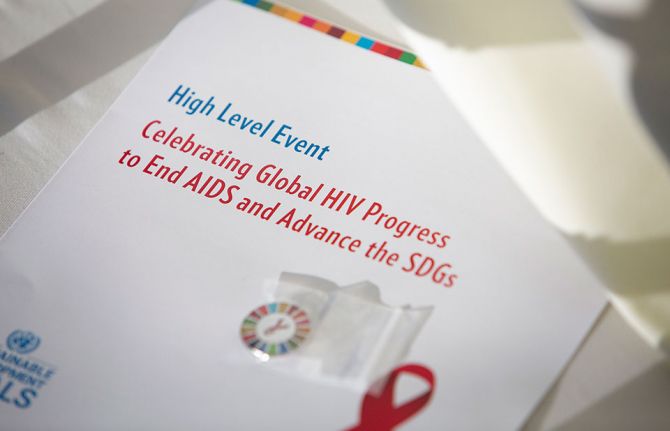
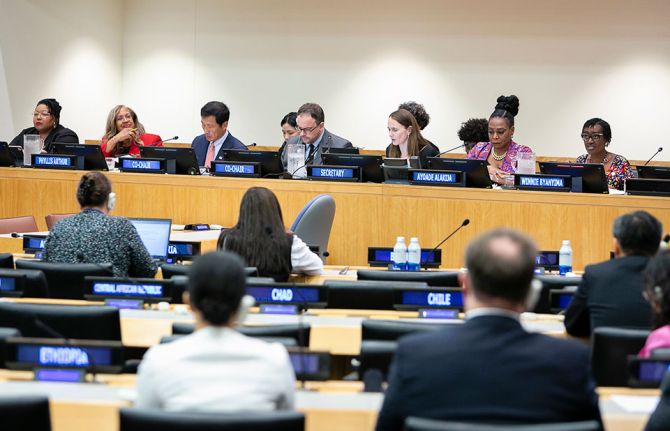


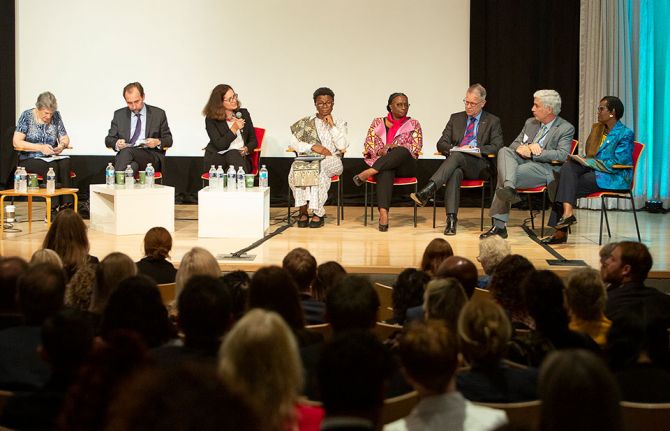
Press Release
UNAIDS’ key takeaways from the 78th United Nations General Assembly
29 September 2023 29 September 2023GENEVA, 29 September 2023—The topic of the global AIDS response—including its successes and invaluable lessons for handling pandemics—permeated many discussions during last week’s United Nations General Assembly (UNGA) in New York. From three High-Level meetings on health, to the Sustainable Development Goals (SDG) Summit to remarks given to the General Assembly and at High-Level Side events, the lessons from 40 years of responding to HIV—including the principle of leaving no one behind—were repeatedly referenced in the context of a future of health and equality for all.
In his remarks to the General Assembly, United States President Joe Biden referenced success against AIDS as a platinum example of what global solidarity and shared responsibility can achieve. “HIV/AIDS infections and deaths plummeted in no small part because of PEPFAR’s work in more than 55 countries, saving more than 25 million lives,” said President Biden. “It’s a profound testament to what we can achieve when we act together when we take on tough challenges and an admonition for us to urgently accelerate our progress so that no one is left behind.”
At the opening of the SDG Summit, Irish prime minister, Leo Eric Varadkar noted that half-way to the 2030 targets we are not where we would wish to be with only 15% of the SDGs on target. He added that despite this there is progress. “More than 800 million people have been connected to electricity since 2015, 146 countries have met or are on track to achieving the under-five mortality target, and effective HIV treatment has halved global AIDS-related deaths since 2010,” said Mr Varadkar. “This progress shows that change is possible, that backsliding is not inevitable, and that poverty, pollution and gender inequality are not pre-ordained. They are trends that can be reversed, problems that can be solved and tragedies that can be averted.”
While celebrating the collective success against AIDS, UNAIDS urged leaders to keep HIV high on political agendas for three reasons. “Firstly,” said Winnie Byanyima, Executive Director of UNAIDS, “The job is not yet done—43 years into the pandemic, there are still more than 9 million people waiting for life-saving treatment, more than 1.3 million new HIV infections every year and AIDS took a life every minute in 2022. Secondly: We know how to end AIDS and, we have the path and the power to do it. And thirdly: The AIDS response is a smart investment yielding other health, social and economic impacts.”
A number of ministers and heads of state spoke about the economic challenges they face as the result of multiple and concurrent crises, and the need for cooperation and solidarity to overcome these crises while continuing to make critical investments in development and health. Many political leaders noted that while the political will is there, there are not enough domestic resources to invest in health, education and social protection.
The UN Secretary-General Antonio Guterres reminded the international community that there is an urgent need to rethink—and reconfigure--the international financial architecture in order to achieve the SDGs. The same is true for UNAIDS's mission to end AIDS as a public health threat and ensure those gains are sustained well beyond 2030. Ending AIDS requires new and sustained resources, and a different political discourse on funding for development. UNAIDS highlighted the importance for maintaining bilateral funding for PEPFAR and multilateral funding for the Global Fund to Fight AIDS, TB and Malaria.
UNAIDS stressed that as we develop a global architecture for pandemics prevention, preparedness and response, we need to draw from over 40 years of responding to AIDS, because the AIDS response is pandemic prevention, preparedness and response.
The importance of community-led responses as essential to reaching marginalized groups and people most affected by pandemics was emphasized. UNAIDS highlighted that the Pandemic Accord must acknowledge the central role of community-led responses and commit member states to include communities and civil society in decision-making, planning, preparation, implementation and monitoring.
The call to end inequalities was a central theme to UNAIDS’ messaging at UNGA. UNAIDS highlighted the need for equitable, affordable access to life saving medical products and how inequality drives, and prolongs, pandemics. UNAIDS advocated metrics, targets and accountability systems for focusing the response and additionally for advancing human rights to improve public health and warned that human rights violations undermine trust and drive people away from health services.
Finally, UNAIDS called for a multisectoral/whole of society approach to effectively prevent, prepare for and respond to pandemics because pandemics are not merely health crises—they also present political, social and economic challenges which require transformative action by all.
The Executive Director of UNODC, Ms Ghada Waly, on behalf of UNAIDS’ cosponsoring organizations acknowledged that, “The multi-sectoral partnership on HIV/AIDS is as important as ever, bringing together the expertise, assets and comparative advantages of 11 Cosponsors in an exemplary partnership for the development approach of the SDGs.”
UNAIDS
The Joint United Nations Programme on HIV/AIDS (UNAIDS) leads and inspires the world to achieve its shared vision of zero new HIV infections, zero discrimination and zero AIDS-related deaths. UNAIDS unites the efforts of 11 UN organizations—UNHCR, UNICEF, WFP, UNDP, UNFPA, UNODC, UN Women, ILO, UNESCO, WHO and the World Bank—and works closely with global and national partners towards ending the AIDS epidemic by 2030 as part of the Sustainable Development Goals. Learn more at unaids.org and connect with us on Facebook, Twitter, Instagram and YouTube.
